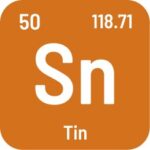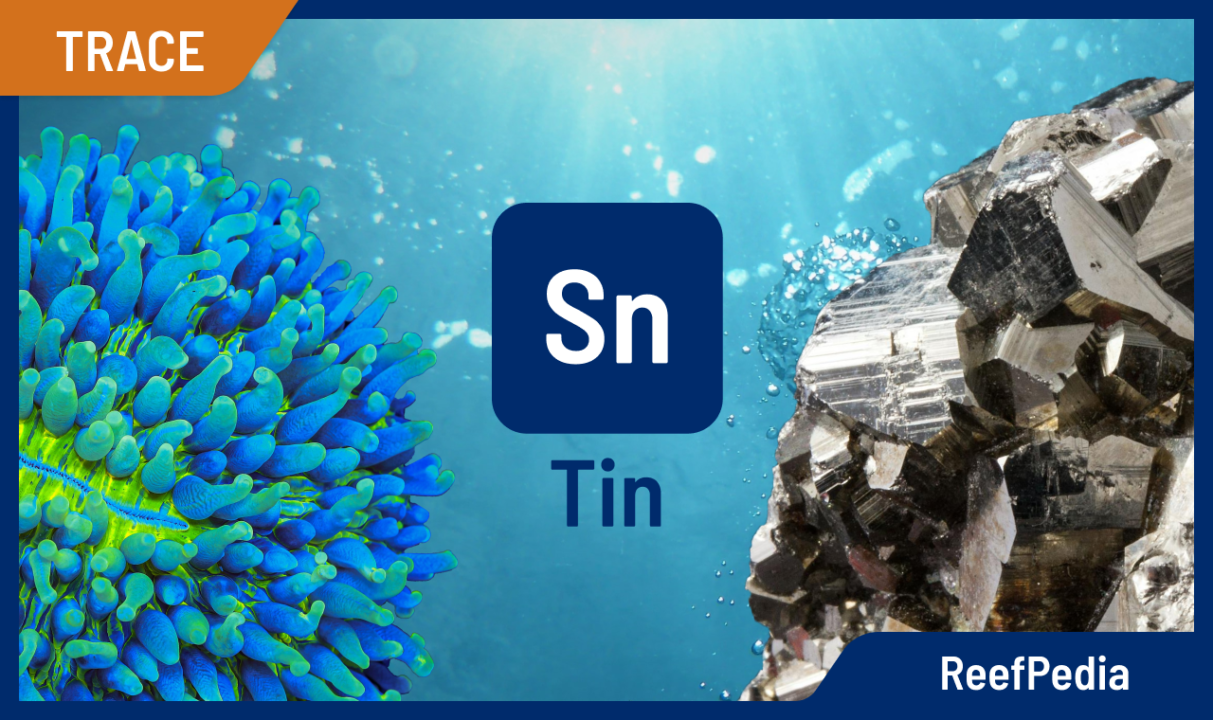Table of Contents
What is TIN (Sn)?
 Tin (Sn, Latin: stannum) is an element belonging to the XIV group of the periodic table, known as the carbon group. Elements such as carbon (C), silicon (Si), germanium (Ge), and lead (Pb) also belong to this group. Tin forms chemical compounds where it primarily exists in oxidation states of -IV, +II, and +IV.
Tin (Sn, Latin: stannum) is an element belonging to the XIV group of the periodic table, known as the carbon group. Elements such as carbon (C), silicon (Si), germanium (Ge), and lead (Pb) also belong to this group. Tin forms chemical compounds where it primarily exists in oxidation states of -IV, +II, and +IV.
The importance of tin in seawater
Tin doesn’t have beneficial properties for marine animals. Its toxicity to living organisms increases when tin is combined with other compounds. Organic tin compounds can accumulate in the tank over time and pose a threat to marine animals. The presence of tin in the reef tank should be considered as contamination. Higher concentrations of tin, detectable by ICP-OES, are toxic to corals.
Dangers related to the presence of tin in seawater
The presence of tin in saltwater is undesirable because it is toxic to marine animals. High levels of tin can lead to health problems and even death in corals and other animals. Excess tin adversely affects most animals, with SPS corals being particularly sensitive to high tin levels (>10 µg/l). At such high levels, corals are at risk of tissue detachment and death. Tin compounds, especially those with organic compounds, are particularly toxic as they resist biodegradation and persist in the tank for a long time.
High levels of tin in the tank also disrupt enzymatic processes and the proper functioning of marine organisms, such as coral growth.
How to protect the aquarium?
It is important to regularly monitor the tin content and maintain it at an undetectable level – 0 µg/L. Such a level of tin in saltwater ensures the health and vibrant coloration of marine animals.
The most accurate and reliable method for determining tin is through ICP-OES analysis. Inductively Coupled Plasma Optical Emission Spectrometry (ICP-OES) is the most precise analytical method for analyzing the elemental composition of seawater.
Recommendations
To ensure the proper level of tin in the aquarium, you should regularly test it. If the tin level remains high for an extended period, it can lead to health problems for corals and other animals, and even their death. The most common causes of exceeding tin:
- contaminated salt,
- pump impellers,
- metal elements in RO systems,
- adhesives and cements.
Find and eliminate the cause of the problem, and lower the value of this parameter in the water. Perform up to 6 water changes. It is recommended to replace about 15% of the aquarium water during each change until the recommended value of this parameter is reached. The water prepared for the change must have the appropriate target salinity level. Use salt with the correct parameters and composition suitable for conducting the ICP test.
Summary
The presence of tin, especially when combined with organic compounds, can have a negative impact on marine organisms. High concentrations of tin are toxic to corals and other marine organisms, contributing to their diseases or death. To prevent the negative effects of high tin levels in saltwater aquariums, it is recommended to regularly monitor its level.
*The name carbonates refers to the elements found in group XIV of the periodic table. This group includes elements with similar properties.
About author

Magdalena Metzler
Privately, I am a mother and a lover of nature and sport. My main interest is quantum chemistry, which hides a whole lot of unsolved mysteries and connections, which is extremely exciting from a scientific point of view.
In my scientific career, I have conducted international projects focused on innovative solutions for many branches of business, e.g. automotive, construction, and now, of course, marine aquaristics.
Working at Reef Factory gave me a passion for marine aquaristics, which I can develop every day, building a chemistry department and creating products that will help aquarists take care of tanks and ensure the highest safety of animals. One of the most exciting memories of working at Reef Factory is the commissioning of the ICP-OES spectrometer, which analyzes the elemental composition of seawater. The method of analysis in ICP is based on an analytical technique, which is a combination of my passion for quantum chemistry and marine aquaristics.
I hope you find my articles on ReefPedia interesting and helpful! Happy reading :))

